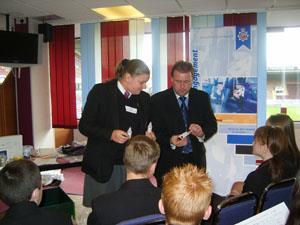An RSC Chemistry at Work event for 14-19-year olds, held in November, marked the launch of a two-year project to expand these events in England
A Royal Society of Chemistry (RSC) Chemistry at Work event for 14-19-year olds, held in November at Burnley Football Club, Turf Moor, marked the launch of a two-year project to expand these events in England by Chemistry the next generation (C:TNG), the Aimhigher chemistry outreach initiative also run by the RSC.
The C:TNG project will spend £50k across each of its three new regions - Yorkshire and Humberside, the North East and the South East - for up to 20 Chemistry at Work events aimed at its target audience, ie 14-19-year old students who have the ability but are currently unlikely to go on and study the chemical sciences in HE.
A model project

Organised by the RSC and SETPOINT Lancashire, the Turf Moor event will act as the model for the project. The aim of the event remains much the same as that of the original Chemistry at Work events, ie to offer students the opportunity to find out about how the chemistry they learn at school is relevant to everyday life and the worlds of industry and research.
At the Turf Moor event, 150 students from 10 local schools spent the day in small groups taking part in interactive hands-on workshops. Run by local organisations, the workshops covered topics including crime scene chemistry, microbiology testing in foods and renewable energy generation. As well as having the opportunity to meet and work with people who use the chemical sciences in their jobs the students were also treated to colourful reactions and loud bangs in a demonstration lecture, Flash, bang and Son et luminere, from Manchester University chemist Dr Sarah Heath.
As part of C:TNG's ongoing activities in this and its other two new regions, students will, over the next two years, also take part in a series of linked activities focusing on applied chemistry and science. They will participate in student-led activities that will help them to develop their practical skills in science and technology, as well as problem-solving, data handling and science communication skills. For example, Science and Engineering Ambassadors will act as industry mentors for their schools' science clubs where the students will do independent CREativity in Science and Technology (CREST) projects at bronze- and silver-level. Visits to science museums and centres, and science competitions will also feature in the students' calendars.
According to C:TNG national coordinator Kate Burrell, Chemistry at Work events in the three regions will run at venues that can cater for the student numbers and 10-20 workshops, for example science learning centres, exhibition centres, sports grounds, industrial sites, education-business partnership sites, in schools etc. 'Each will be linked to a structured follow-up programme of activities', she told Education in Chemistry, 'and a few events in each region will be aimed at primary students'.
For further information on C:TNG activities contact Dr Kate Burrell, the Royal Society of Chemistry.
Chemistry at Work nationwide
Meanwhile, the RSC's regular programme of Chemistry at Work events is ongoing. Although traditionally aimed at the 13-16 age group, increasingly events are being put on for primary school and post-16 students. Two events are scheduled for this month: a primary focused event will be held at Dundee College on 17-19 January; and one-day event will be run at Budehaven Community School, Cornwall on 18 January. For further information on Chemistry at Work events in your locale and to find out how your school can get involved or contact Dr John Payne, Chemistry at Work national coordinator.
Contact and Further Information
John Payne
Chemistry at Work National Coordinator
Royal Society of Chemistry, Burlington House, Piccadilly, London W1J 0BA
Email: John Payne






No comments yet